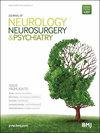POTASSIUM AND MUSCULAR DISORDERS.
引用次数: 4
Abstract
IT has been shown in a previous paper (Cumings, 1939b) that the potassium content of muscle was abnormal in two diseases, except for conditions in which fat or fibrous tissue replacement of muscle occurs. Some further muscles from a variety of diseases have since been examined and the results have not given rise to any change of opinion. It has also been shown (Cumings, 1939b, 1940) that muscles from myasthenia gravis contain an excess of potassium, which was liberated after prostigmin injection, with a resulting increase of the serum potassium level. There was, however, no increased urinary excretion of potassium, the potassium returning to the muscles as the muscles became weaker. The amount of potassium present in excess in the serum did not account for all the potassium which was estimated to have been liberated from the muscles. Two more patients with myasthenia have been investigated to confirm the previous results and to determine whether the red cells also showed an increase in their potassium content, and the results are recorded. Some experimental results are also recorded in which rabbits were injected with substances extracted from gelsemium roots in an endeavour to produce muscular disorders in any way comparable to myasthenia.钾和肌肉失调。
本文章由计算机程序翻译,如有差异,请以英文原文为准。
求助全文
约1分钟内获得全文
求助全文

 求助内容:
求助内容: 应助结果提醒方式:
应助结果提醒方式:


